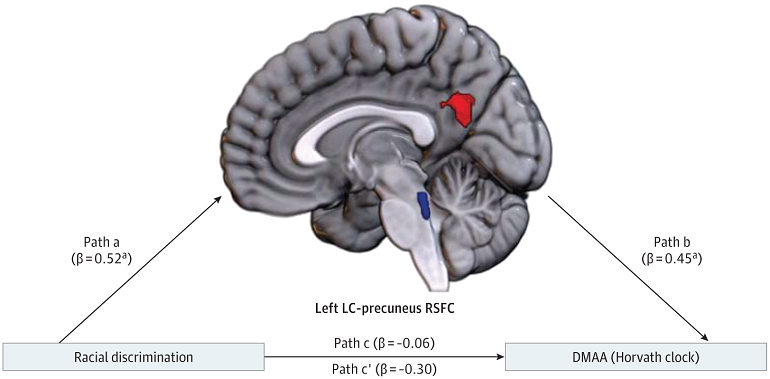
Tanja Jovanovic, Ph.D., director and principal investigator of the Detroit Trauma Project at the Wayne State University School of Medicine, is among a team of collaborators whose new study suggests that racial discrimination is associated with altered brain activity, which may increase vulnerability for developing stress-related disorders and neurodegenerative disease via epigenetic age acceleration.
The cohort study of 90 Black women in the United States showed that higher self-reported racial discrimination was associated with greater resting-state functional connectivity between the locus coeruleus – a spot in the brain involved with physiological responses to stress and panic – and the precuneus – a portion of the brain responsible for episodic memory and self-reflection.

The study “Racial Discrimination, Neural Connectivity, and Epigenetic Aging Among Black Women” is published in the journal JAMA Network Open.
The study is among the first to show that experiences of racial discrimination can have profound effects of the brain and body, leading to changes in brain function and accelerating biological aging.
“I played a role in deciding which questions were investigated with respect to understanding the impact of trauma exposure on brain and biology. Racial discrimination has a significant negative impact on health in Black Americans, so we wanted to make sure that we are able to address this issue in our research,” Dr. Jovanovic said.
A professor of Psychiatry and Behavioral Neurosciences, and the David and Patricia Barron Chair for Post-Traumatic Stress Disorder Neurobiology at WSU, Dr. Jovanovic’s research focuses on the interaction of traumatic experiences, neurophysiology, neuroendocrinology and genetics in stress-related disorders in adults and children in high-risk populations.
The study was conducted between Jan. 1, 2012, and Feb, 28, 2015, and included a community-based sample of Black women over 18 years old recruited as part of the Grady Trauma Project. Dr. Jovanovic previously served as director of the Grady Trauma Project at Emory University School of Medicine in Atlanta.
She joined the School of Medicine in 2018. At WSU, she established a parallel research program, the Detroit Trauma Project, with the focus on urban health.
Her lab is working to better understand the ways that racism impacts the health of minority individuals, especially during development. She has developed collaborations at WSU, including with Dr. Alissa Huth-Bocks and Dr. Olivenne Skinner at the Merrill Palmer Skillman Institute, to analyze the negative consequences of discrimination in Black youth.
The Detroit Trauma Project investigates the impact that urban trauma exposure has on the brain. Her research employs psychophysiological and brain imaging methods such as magnetic resonance imaging and functional magnetic resonance imaging to investigate biomarkers of risk for trauma-related psychopathology, such as post-traumatic stress disorder.